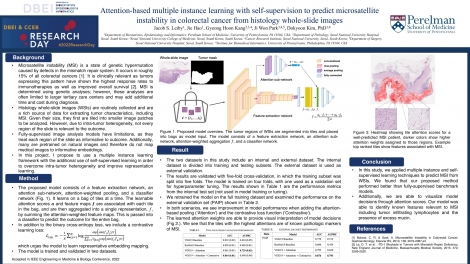Jacob Leiby
Attention-based Multiple Instance Learning with Self-supervision to Predict Microsatellite Instability in Colorectal Cancer from Histology Whole-Slide Images

Presenter

I am a third year GCB student in Dokyoon Kim's Lab. I am interested in biomedical image analysis.
Abstract
Microsatellite instability (MSI) is a state of genetic hypermutation caused by defects in the mismatch repair system. It occurs in roughly 15% of all colorectal cancers. MSI is clinically relevant in colorectal cancer as tumors expressing this pattern have shown the highest response rates to immunotherapies as well as improved overall survival. MSI can be determined using genetic analyses, however, these analyses are often limited to larger tertiary care centers and may add additional time and cost during diagnosis.
Manual inspection of hematoxylin and eosin-stained (H&E) tissue slides remains the gold-standard in solid-tumor cancer diagnosis. With the adoption and validation of digitizing these slides as whole-slide images (WSIs) for manual examination, rich data are available for computational analyses beyond simple diagnosis. In recent years, deep learning models have been developed and applied to WSI analysis for a variety of tasks including mitosis detection, survival prediction, and predicting MSI. These studies have shown promising results in using deep learning models to objectively determine cancer characteristics from WSIs.
This study develops a model to predict MSI directly from WSIs. Making use of both weakly- and self-supervised deep learning techniques, the proposed model shows improved performance over conventional deep learning models. Additionally, the proposed framework allows for visual interpretation of model decisions. These results are validated in internal and external testing datasets.
Keywords
deep learning, histology, microsatellite instabilityAbout Us
To understand health and disease today, we need new thinking and novel science —the kind we create when multiple disciplines work together from the ground up. That is why this department has put forward a bold vision in population-health science: a single academic home for biostatistics, epidemiology and informatics.
© 2023 Trustees of the University of Pennsylvania. All rights reserved.. | Disclaimer

